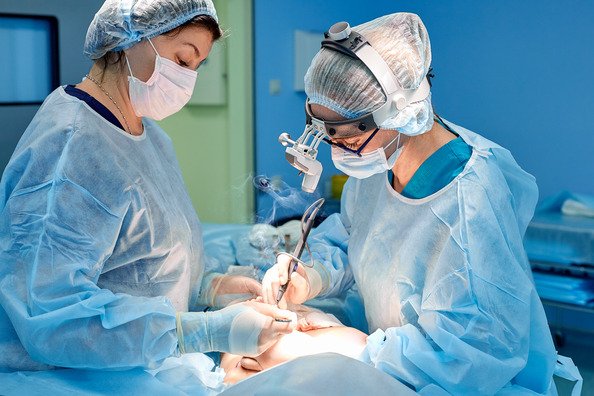In the evolving world of medical science, laparoscopic surgery stands out as a significant advancement, offering patients minimal invasiveness, reduced recovery times, and less post-operative discomfort. Among the leading practitioners of this innovative surgical technique in Faridabad is Dr. Astha Chakravarty, whose expertise and commitment to patient care have established her as the best laparoscopic surgeon in the region.
Introduction to Laparoscopic Surgery
Laparoscopic surgery, also known as minimally invasive surgery, has revolutionized the field of surgery by offering a less invasive alternative to traditional open surgeries. This technique is particularly renowned for its use in abdominal and pelvic operations. A laparoscopic surgeon specializes in performing these surgeries, using advanced technology and small incisions to minimize patient discomfort and recovery time.
What is Laparoscopic Surgery?
Laparoscopic surgery involves making small incisions, usually 0.5-1.5 cm, through which specialized instruments and a camera (laparoscope) are inserted. The camera transmits images of the internal organs onto a monitor, giving the surgeon a clear and magnified view. This method contrasts with traditional surgery, where large incisions are required to access the surgical area.
Advantages of Laparoscopic Surgery
The benefits of laparoscopic techniques are significant:
- Reduced Pain and Scarring: Smaller incisions cause less tissue damage, resulting in lower postoperative pain and more minor scars.
- Shorter Hospital Stay: Patients often return home the same day or the day after surgery.
- Quicker Recovery: Reduced recovery time allows patients to return to normal activities much sooner.
- Lower Risk of Infection: Smaller incisions decrease the exposure of internal organs to external contaminants, which reduces the risk of infections.
Common Procedures Performed by Laparoscopic Surgeons
Laparoscopic surgeons perform a wide range of surgeries, some of the most common include:
- Gallbladder Removal (Cholecystectomy): One of the most frequent laparoscopic surgeries.
- Hernia Repair: Used for diagnosing and repairing various types of hernias.
- Appendectomy: Removal of the appendix.
- Hysterectomy: Removal of the uterus and possibly other reproductive organs.
- Weight Loss Surgeries: These include gastric bypass or sleeve gastrectomy.
Training and Qualifications of a Laparoscopic Surgeon
Becoming a laparoscopic surgeon requires extensive training. After completing medical school, a prospective surgeon must finish a general surgery residency followed by a fellowship in minimally invasive surgery. This specialized training focuses on the techniques and skills necessary for performing laparoscopic procedures.
Technological Advances in Laparoscopic Surgery
The field of laparoscopic surgery continues to evolve with technological advancements. Innovations such as robotic surgery, enhanced imaging techniques, and improved instrument designs make surgeries even more precise and less invasive. Robotic systems, for example, provide surgeons with enhanced agility and control, allowing for even more complex procedures to be performed laparoscopically.
Choosing a Laparoscopic Surgeon
When choosing a laparoscopic surgeon, it’s important to consider their qualifications, experience, and the quality of the healthcare facility. Patients should look for surgeons with a proven track record of success performing the specific type of laparoscopic surgery they need. Additionally, consultations before surgery can provide insights into the surgeon’s approach and patient care philosophy.
Laparoscopic surgery represents a significant advancement in surgical techniques, offering benefits that greatly enhance patient recovery and outcomes. With ongoing advancements in technology and technique, laparoscopic surgeons are set to continue improving the efficiency and safety of surgical treatments, making it a preferred choice for many surgical procedures.
As this field grows, so does the importance of understanding the capabilities and limitations of laparoscopic surgery, ensuring patients receive the best possible care tailored to their specific medical needs.
Dr. Astha Chakravarty – Leading Laparoscopic Surgeon
Dr. Astha Chakravarty is the best laparoscopic surgeon in Faridabad, known for her skilled surgical techniques and a deep understanding of patient needs. With years of experience and specialized training in minimally invasive surgery, Dr. Astha Chakravarty has successfully performed numerous procedures, making significant contributions to the field of laparoscopy.

Specialties and Expertise
Dr. Astha Chakravarty specializes in a wide range of laparoscopic procedures, including, but not limited to:
- Laparoscopic Hysterectomy: This procedure involves the removal of the uterus and is performed through small incisions, reducing healing time and associated risks.
- Laparoscopic Cholecystectomy: Commonly known as gallbladder removal, this is one of the most frequently performed surgical procedures worldwide and a specialty of Dr. Astha Chakravarty.
- Diagnostic Laparoscopy: Often used to diagnose and sometimes treat sources of abdominal and pelvic pain, this is a testament to Dr. Astha Chakravarty’s comprehensive approach to patient health.
Her approach to surgery integrates the latest technological advancements in medical science, ensuring high precision and improved outcomes.
Commitment to Patient Care
Dr. Astha Chakravarty’s practice is patient-centered, focusing on providing comprehensive care that extends beyond the operating table. She believes in educating her patients about their conditions and the available surgical options, empowering them to make informed decisions about their health. Her commitment to patient care is evident in her meticulous attention to detail, personalized care plans, and the compassionate approach she takes with each patient.
Why Choose Dr. Astha Chakravarty?
Advanced Surgical Techniques
Dr. Astha Chakravarty employs the most advanced laparoscopic techniques available today. These methods not only facilitate quicker recoveries and less post-operative pain but also minimize the risks associated with larger, more invasive surgeries.
Lower Risk of Complications
The precision of laparoscopic surgery results in fewer complications compared to traditional surgery. Dr. Astha Chakravarty’s expertise significantly lowers the risk of infections and post-surgical complications, which is a crucial consideration for patients undergoing surgery.
Quick Recovery Time
One of the most significant benefits of choosing Dr. Astha Chakravarty for laparoscopic surgery is the reduced recovery time. Patients typically experience quicker healing, less post-operative pain, and faster return to normal activities.
High Patient Satisfaction
Dr. Astha Chakravarty’s dedication to her patients and her success in laparoscopic procedures have earned her high praise and satisfaction ratings from her patients. Testimonials from previous patients often highlight her professionalism, skill, and compassionate bedside manner.
Conclusion
Choosing the right surgeon is a critical decision for patients considering laparoscopic surgery. Dr. Astha Chakravarty’s reputation as the best laparoscopic surgeon in Faridabad is well-deserved, built on her extensive experience, patient-centered approach, and commitment to using the latest surgical techniques. For those in and around Faridabad, Dr. Astha Chakravarty represents the ideal choice for anyone needing laparoscopic surgery, providing expert care with a focus on safety, efficacy, and the overall well-being of her patients.
For more information or to schedule a consultation, patients are encouraged to contact her clinic directly. With Dr. Astha Chakravarty, you are in skilled and caring hands.
FAQs
1. What is laparoscopic surgery?
Ans. Laparoscopic surgery, also known as minimally invasive surgery, is a modern surgical technique in which operations are performed through small incisions (usually 0.5–1.5 cm) in the body. It utilizes specialized instruments and a laparoscope, a long fiber-optic cable system that allows viewing of the affected area by snaking the cable from a more distant, but less invasive, location.
2. What are the benefits of laparoscopic surgery?
Ans. The benefits of laparoscopic surgery include smaller surgical scars, reduced pain and bleeding, shorter recovery time, and lower risk of infection. Patients often experience a quicker return to normal daily activities compared to traditional open surgery.
3. What conditions can be treated with laparoscopic surgery?
Ans. Laparoscopic surgery is used for many procedures, including but not limited to, removal of the gallbladder (cholecystectomy), repair of hernias, removal of parts of the intestines, and gynecological and urological surgeries. It is also frequently used in weight loss surgeries and diagnostic procedures in the abdomen.
4. How should I prepare for laparoscopic surgery?
Ans. Preparation for laparoscopic surgery may involve several steps, including fasting, bowel preparation, and preoperative tests. Your surgeon will provide specific instructions based on the type of surgery and your medical history. It is important to follow these instructions carefully to minimize risks.
5. What are the risks of laparoscopic surgery?
Ans. While laparoscopic surgery is generally safe, it carries potential risks like any surgical procedure. These include complications from anesthesia, bleeding, infection, damage to nearby organs, and the risk of conversion to an open surgery if complications arise during the procedure.
6. Who is a laparoscopic surgeon?
Ans. A laparoscopic surgeon is a medical doctor who specializes in performing laparoscopic surgery. These surgeons have undergone extensive training in general surgery and additional specialized training in minimally invasive techniques.
7. How do I choose a laparoscopic surgeon?
Ans. When choosing a laparoscopic surgeon, consider their qualifications, experience, and the number of similar procedures they have performed. It is also important to consider the quality of the hospital or clinic where the surgery will be performed and to review patient testimonials or ratings if available.
8. What is the recovery process like after laparoscopic surgery?
Ans. Recovery after laparoscopic surgery generally involves less discomfort and a shorter hospital stay compared to open surgery. Recovery times vary depending on the type of surgery and individual patient factors, but many patients return to normal activities within a few days to weeks.
9. Will I have scars after laparoscopic surgery?
Ans. Laparoscopic surgery typically results in several small scars instead of one large scar. These scars are usually less noticeable and may fade over time. The size and visibility of the scars depend on the specific procedures performed and individual healing factors.
10. Can laparoscopic surgery be used for cancer treatment?
Ans. Yes, laparoscopic surgery is often used to diagnose, stage, and treat some types of cancer. It allows surgeons to remove tumors and examine tissue without making large incisions, which can help reduce recovery time and improve outcomes in some cases.

